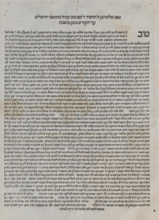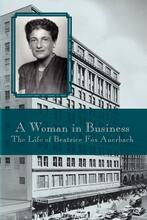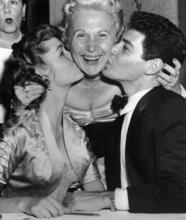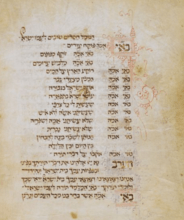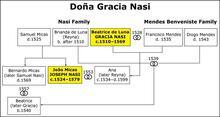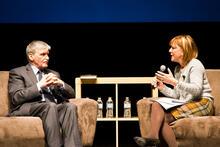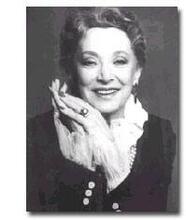Julia Waldbaum
Julia Waldbaum was a philanthropist and businesswoman. Raised in the Bedford-Stuyvesant section of Brooklyn, Waldbaum married the owner of a local store and had three children. Soon the family had a chain of seven grocery stores, to which she always applied her personal touch through marketing and other means. By 1986, the Waldbaum stores had gross revenues of $1.37 billion from 140 locations in New England. Throughout, Waldbaum remained committed to the brand and to her customers, visiting stores as a surprise every month. Aside from the franchise, Waldbaum was committed to zedakah, and was the honoree at numerous fundraising dinners hosted by a wide range of charities.
Article
Julia Waldbaum was a philanthropist and businesswoman. In every context, whether personal, professional, or philanthropic, she had a gift for making each individual with whom she came in contact feel special.
She was born in Manhattan on July 4, 1897, to Harry and Anna Leffel. She was the second of three daughters and the third of six children. She grew up in the Bedford-Stuyvesant section of Brooklyn.
At twenty-one, she married Israel (Izzy) Waldbaum, an Austrian immigrant seven years her senior who owned the local butter and egg store. The marriage, which produced three children—Shirley, Phyllis, and Ira—lasted until Israel’s death at age fifty-five in 1947.
By that time, the family had a chain of seven stores, and the “personal touch,” which Julia Waldbaum brought to every aspect of life, including the marketing of groceries, was evident. The expanding chain of stores had over four hundred products bearing its private label by the 1960s, and Waldbaum’s picture—with recipes she tested at home—appeared on virtually all those labels except, as she once joked to a reporter, “the dog food and the bathroom tissue.”
In 1986, gross revenues of $1.37 billion a year from 140 stores in New York, Connecticut, and Massachusetts made the chain an attractive acquisition for the Great Atlantic and Pacific Tea Company, which purchased most of the family stock. Even after transferring control, however, Waldbaum still made some thirty surprise visits to Waldbaum’s stores every month. She was concerned with quality, cleanliness, and service, and her pet peeves included bruised fruit and dusty shelves. Checkout clerks who could not be bothered to thank patrons for their business particularly drew her ire.
That attention to detail led Waldbaum to insist upon keeping her home telephone number in the directory for years after her family wanted her to get an unlisted number. She explained that customers should be able to reach her so that they would not think that “Mrs. Waldbaum [was] an imaginary person like Betty Crocker.”
Although raised in an Orthodox household, Waldbaum became a Reform Jew in later life. Her profound commitment to the Jewish principle of Lit. "righteousness" or "justice." Charityzedakah was expressed both through personal and monetary participation in a vast and ecumenical array of philanthropies as diverse as foster homes and opera companies. She was also the honoree at numerous fund-raising dinners given by charities ranging from the Anti-Defamation League to Brooklyn’s Catholic Charities. On those occasions, Waldbaum greeted every subscriber personally and attendance often broke records.
Despite a calendar crowded with work and philanthropic obligations, Julia Waldbaum always made time for her family. She shared with a son-in-law the upbringing of three of her grandchildren after the untimely death of her daughter Phyllis left them motherless. Frequent Friday dinners at Waldbaum’s home were a time for all the extended family to gather and recount the events of the week.
In her ninety-ninth year, Julia Waldbaum died in her sleep on September 30, 1996, at her home in Queens, New York City. She was survived by two siblings, two children, ten grandchildren and twenty-four great-grandchildren.
Malinsky, Randie [granddaughter]. Telephone interview by author, 1996.
Obituary. NYTimes, October 3, 1996.
Waldbaum, Nancy [granddaughter]. Telephone interview by author, 1996.

